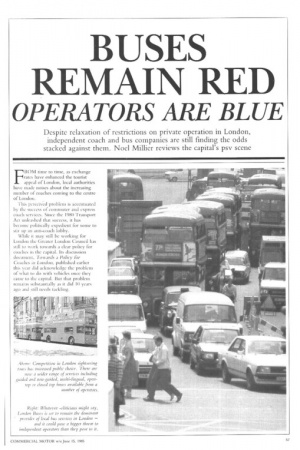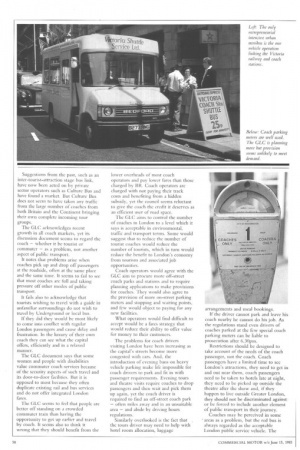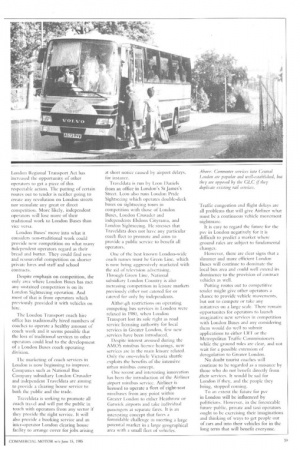BUSES REMAIN RED
Page 59

Page 60

Page 61

If you've noticed an error in this article please click here to report it so we can fix it.
OPERATORS ARE BLUE
Despite relaxation of restrictions on private operation in London, independent coach and bus companies are still finding the odds stacked against them. Noel Millier reviews the capital's psv scene
FROM time to time, as exchange rates have enhanced the tourist appeal of London, local authorities have made noises about the increasing number of coaches coming to the centre
of London. ..
This perceived problem is accentuated by the success of commuter and express coach services. Since the 1980 Transport Act unleashed that success, it has become politically expedient for some to stir up an anti-coach lobby.
While it may still be working for London the Greater London Council has still to work towards a clear policy for coaches in the capital. Its discussion document, Towards a Policy for Coaches in London, published earlier this year did acknowledge the problem of what to do with vehicles once they came to die capital. But that problem remains substantially as it did 10 years ago and still needs tackling.
Suggestions from the past, such as an inter-tourist-attraction stage bus link, have now been acted on by private sector operators such as Culture Bus and have found a market. But Culture Bus does not seem to have taken any traffic from the large number of coaches from both Britain and the Continent bringing their own complete incoming tour groups.
The GLC acknowledges recent growth in all coach markets, yet its discussion document seems to regard the coach — whether it be tourist or commuter — as a problem, not another aspect of public transport.
It notes that problems arise when coaches pick up and drop off passengers at the roadside, often at the same place and the same time. It seems to fail to see that most coaches are full and taking pressure off other modes of public transport.
It fails also to acknowledge that tourists wishing to travel with a guide in unfamiliar surroundings do not wish to travel by Underground or local bus.
If they did they would be most likely to come into conflict with regular London passengers and cause delay and frustration. In the luxury of their own coach they can see what the capital offers, efficiently and in a relaxed manner.
The GLC document says that sonic women and people with disabilities value commuter coach services because of the security aspects of such travel and its door-to-door facilities. But it is opposed to most because they often duplicate existing rail and bus services and do not offer integrated London fares.
The GLC seems to feel that people are better off standing on a crowded commuter train than having the opportunity to get up earlier and travel by coach. It seems also to think it wrong that they should benefit from the lower overheads of most coach operators and pay lower fares than those charged by BR. Coach operators are charged with not paying their track costs and benefiting from a hidden subsidy, yet the council seems reluctant to give the coach the credit it deserves as an efficient user of road space.
The GLC aims to control the number of coaches in London to a level which it says is acceptable in environmental, traffic and transport terms. Some would suggest that to reduce the number of tourist coaches would reduce the number of tourists, which in turn would reduce the benefit to London's economy from tourism and associated job opportunities.
Coach operators would agree with the GLC aim to procure more off-street coach parks and stations and to require planning applications to make provisions for coaches. They would also agree to the provision of more on-street parking meters and stopping and waiting points, and few would object to paying for any new facilities.
What operators would find difficult to accept would be a fares strategy that would reduce their ability to offer value for money to their customers.
The problems for coach drivers visiting London have been increasing as the capital's streets become more congested with cars. And, the introduction of evening bans on heavy vehicle parking make life impossible for coach drivers to park and fit in with passenger requirements. Evening tours and theatre visits require coaches to drop passengers and then wait and pick them up again, yet the coach driver is required to find an off-street coach park — often miles away and in an unsuitable area — and abide by driving hours regulations.
Similarly overlooked is the fact that , the tours driver may need to help with hotel room allocation, luggage arrangements and meal bookings.
If the driver cannot park and leave his coach nearby he cannot do his job. As the regulations stand even drivers of coaches parked at the few special coach parking meters can be liable to prosecution after 6.30pm.
Restrictions should be designed to take account of the needs of the coach passenger, not the coach. Coach passengers have a limited time to see London's attractions, they need to get in and out near them, coach passengers need to be taken to hotels late at night, they need to be picked up outside the theatre after the show and, if they happen to live outside Greater London, they should not be discriminated against: or be forced to include another element of public transport in their journey.
Coaches may be perceived in some • areas as a problem, hut the red bus is always regarded as the acceptable London public service vehicle. The London Regional Transport Act has increased die opportunity of other operators to get a piece of this respectable action. The putting of certain routes out to tender is neither going to create any revolution on London streets nor stimulate any great or direct competition. More likely, independent operators will lose more of their traditional work to London Buses than vice versa.
London Buses' move into what it considers non-traditional work could provide new competition on what many independent operators regard as their bread and butter. They could find new and resourceful competition on shorter private hires and staff and school contracts.
Despite emphasis on competition, the only ai-ea where London Buses has met any sustained competition is on its London Sightseeing operation. And most of that is from operators which previously provided it with vehicles on hire.
The London Transport coach hire office has traditionally hired numbers of coaches to operate a healthy amount of coach work and it seems possible that the loss or traditional services to other operators could lead to the development of a London Buses coach operating division.
The marketing of coach services in London is now beginning to improve. Companies such as National Bus Company subsidiary London Crusader and independent Traveldata are aiming to provide a clearing house service to both the public and the trade.
Traveldata is seeking to promote all coach travel and will put the public in touch with operators from any sector if they provide the right service. It will also provide a booking service and an inter-operator London clearing house facility to arrange cover for jobs arising at short notice caused by airport delays, for instance.
Traveldata is run by Leon Daniels from an office in London's St James's Street. Leon also runs London Pride Sightseeing which operates double-deck buses on sightseeing tours in competition with those of London Buses, London Crusader and independents Ebdons Cityrama, and London Sightseeing. He stresses that 'Fraveldata does not have any particular coach fleet to promote and aims to provide a public service to benefit all operators.
One of the best known London-wide coach raTil Cs ni USt be Green Line, which is now being aggressively marketed with the aid of television advertising.
Through Green Line, National subsidiary London Country is also increasing competition in leisure markets previously either not catered for or catered for only by independents.
Altho..gh restrictions on operating competing bus services in London were relaxed in 1980, when London Transport lost its sole right as road service licensing authority for local services in Greater London, few new .,services have been introduced.
Despite interest aroused during the AMOS minibus licence hearings, new services are in the main leisure related. Only the one-vehicle Victoria shuttle exploits the benefits of the intensive urban minibus concept.
One recent and interesting innovation has been die introduction of the Airliner airport minibus service. Airliner is licensed to operate a fleet of eight-seat minibuses from any point within Greater London to either Heathrow or Gatwick airports and take individual passengers at separate Gres. It is an interesting concept that faces a formidable challenge in meeting a large potential market in a large geographical area with a small fleet of vehicles.
Traffic congestion and flight delays are all problems that will give Airliner what must be a continuous vehicle movement nightmare.
It is easy to regard the future for the psv in London negatively for it is difficult to predict a market where ground rules are subject to fundamental changes.
However, there are clear signs that a slimmer and more efficient London Buses will continue to dominate die local bus area and could well extend its dominence to the provision of contract vehicles as well.
Putting routes out to competitive tender might give other operators a chance to provide vehicle movements, but not to compete or take any initiatives on a large scale_ "[here remain opportuintes for operators to launch imaginative new services in competition with London Buses and any considering them would do well to submit applications to either 1..RT or the Metropolitan Traffic Commissioners while the ground rules are clear, and not wait for a possible extension of deregulation to Greater London.
No doubt tourist coaches will
continue to be regarded as a nuisance by those who do not benefit directly from 'their services. It would be sad for London if they, and the people they bring, stopped coining.
To an extent the future for psv in London will be influenced by Ilowever, in the foreseeable future public, private and taxi operators ought to be exercising their imaginations and thinking or ways to get people out of cars and into their vehicles for in the long term that will benefit everyone.




































































































